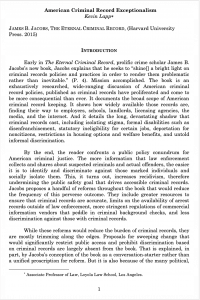American Criminal Record Exceptionalism
Kevin Lapp, 14 Ohio State Journal of Criminal Law 303
According to the article's author, in recent decades, criminal records have proliferated and come to be more consequential than ever. James B. Jacobs’s book, The Eternal Criminal Record (2015), documents their broad scope, wide availability, and the long, devastating shadow that criminal records cast.
In this review, the author organizes the material in this challenging book into three different claims about American criminal record policy: that in the United States, criminal records are (1) exceptionally public, (2) exceptionally punitive, and (3) exceptionally permanent. The author explains how this results in an inexpensive means of sorting and inflicting punishment by devolving a great portion of the work to private actors and the general public.
The article also presents a public policy conundrum for American criminal justice: the more information we collect and share about suspected criminals and actual offenders, the easier it is to identify and discriminate against those marked individuals. This, it turns out, increases recidivism, therefore undermining the public safety goal at the heart of comprehensive, accessible criminal records. To counter this perverse outcome, the author marshals evidence and optimism for reforms that Jacobs considers either unattainable or unwarranted, including the possibility of juvenile justice policy serving as a blueprint for a more redemptive criminal record policy for all.
